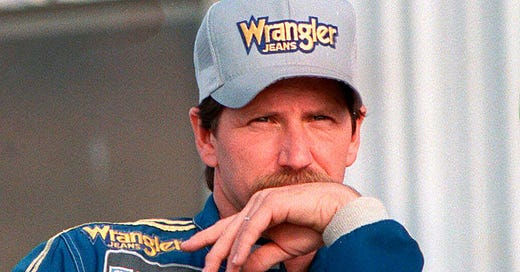‘Earnhardt’ uncovers the man behind the NASCAR myth
Dale Earnhardt is a legend — but he was also a (flawed) human
Growing up, my family hated Dale Earnhardt. By the time I came into this world, he'd won all seven of his Winston Cup championships, and my dad in particular was bored of Earnhardt's domination and the ultra-lucrative business he founded to capitalize on his name. We were firmly a Mark Martin family, because Mark Martin was a good guy and an underdog. As such, most of my earliest memories about Dale Earnhardt are saturated in a layer of distaste.
My husband, however, grew up in the opposite boat. His family rooted for the Earnhardts, Sr. and Jr., with a reverence I didn't quite understand. Wasn't Dale Earnhardt Sr. an asshole? Wasn't his son just riding his dad's coattails? I threw myself into Earnhardt books and documentaries in order to get a better sense of who this guy was, why this myth had been built up around him — and, if I'm honest, most of those pieces of media felt like propaganda. If Dale Earnhardt was the greatest driver in history, then why did my family hate him so damn much? Why do we insist on papering over his aggression?
I've come to better appreciate the Earnhardt family for its impressive legacy, and my bent for history has helped me better situate the Earnhardts within the greater sphere of motorsport. But there was still this part of me that was like, when do I get the real story? When do I finally understand the reasons why this guy was so beloved by many, and why he was so reviled by some?
That moment finally came with Earnhardt.
Earnhardt is a four-part docuseries on Amazon Prime Video that centers around the evolution of Dale Earnhardt's career as both a driver and a marketing maven — but it's also a deeply honest look at the man behind the myth. It includes ample footage from the Earnhardt family archive, as well as ample racing footage set to an exceptional soundtrack. It's a glorious field trip into the heart of prime NASCAR Americana, and yet it's perfectly balanced by cutting interviews, criticisms, and pain.
That honesty can be attributed to the inclusion of Kelley and Dale Earnhardt Jr., two of Earnhardt Sr.'s children.
Earnhardt may have been a larger-than-life personality at the race track, but that didn't always make for a smooth transition into fatherhood. His children are open about craving his affection, attention, and respect, and nearly all of them dedicated a majority of their lives to making him proud — or rebelling when that proved to be a fruitless task. His kids are open about it in ways that are raw and deeply poignant (especially having grown up with a father I, too, was desperate to impress — a task I never achieved).
Add to that Earnhardt's tough-guy façade that only crumbles as he tries to read a script about Neil Bonnett after his great friend's death, his open love for his daughter Taylor Nicole Earnhardt, his stubborn refusal to be pushed to the sidelines, his on-track aggression that softened as he grew older, and his eventual respect for Dale Jr.'s success, and you have a series that actually paints a picture of a human.
And suddenly, Earnhardt's appeal — or his lack thereof, depending on who you ask — was clear. I got it. The moment people stopped trying to squish him into a box to prove that he was Good Beyond Reproach or Bad Beyond Redemption, I could instantly see where he fit into the pantheon of great drivers. I could see how his hard-charging, working-class attitude might speak to the heart of so many NASCAR fans’ experiences, but I could also see how it might turn off the folks who had a bad experience with that kind of mindset growing up. I could appreciate his success and also critique his win-or-wreck-someone-trying attitude without feeling like I needed to make some sweeping conclusion about his moral character. It was an incredibly refreshing change of pace.
Earnhardt also helped me realize the role we all play in the creation of history. I think we've all heard the phrase “history was written by the winner” before, but when it comes to these iconic racers like Earnhardt (or Ayrton Senna), I think the nature of their deaths comes to reshape how we revisit their lives. We end up ignoring completely valid criticisms because we're not supposed to speak ill of the dead, so instead of understanding these people as just that — people — we craft them into untouchable myths. So what if the foundation of that myth isn't based in reality? We can't speak ill of the dead.
The result is a whole lot of unsatisfactory puff pieces. I'm thinking particularly of 3: The Dale Earnhardt Story here, which was not only inaccurate but also ultimately ended up treating Dale Earnhardt like an odds-on hero in ways that were completely unearned.
I'm glad we have Earnhardt to set the record straight, by which I mean, I'm glad we have an investigation of Dale Earnhardt's life that actually feels truer to the man he was. I'm glad we're able to appreciate him, and I'm just as glad we're able to see that he was very far from perfect, particularly when it came to the person he was away from the track. And if you haven't watched it yet, you should change that ASAP.




